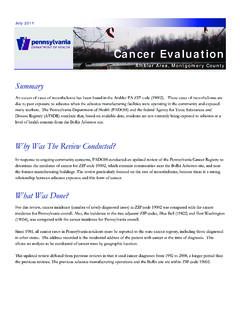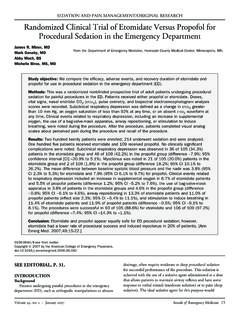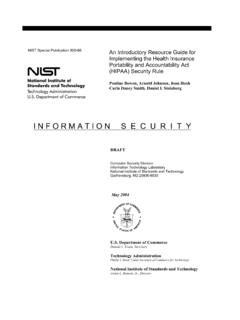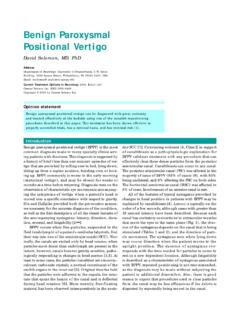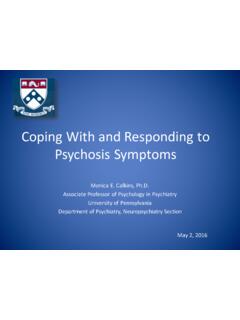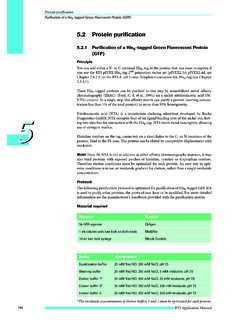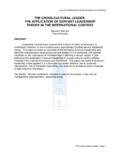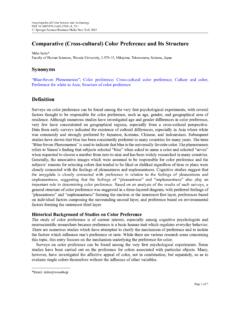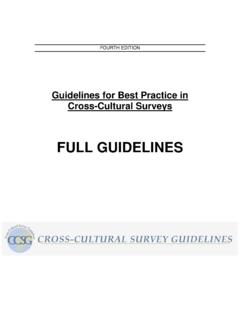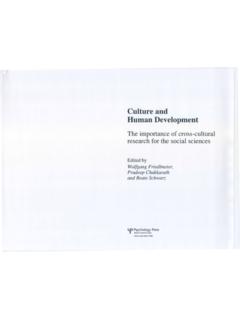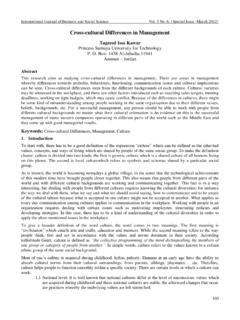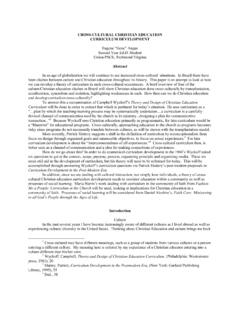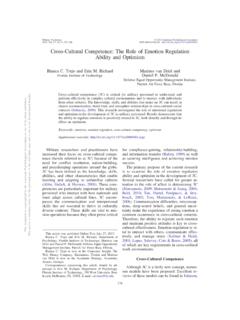Transcription of Cross Cultural Communication in Medicine
1 Cross Cultural Communication in Medicine : Looking Within To See The Outside Better Jerry Johnson, MD Rationale Quantity and Quality of care Decreasing disparity of care Influencing health outcomes Enhancing concordance Decreasing errors in Medicine Decreasing medical malpractice Scientific Research Generating scientific studies that are legitimately generalizable and represent population specific issues Objectives Define the concept of culture State several domains relevant to different cultures Describe several different world views and explanatory models
2 Apply an approach to negotiating management across cultures Culture a Frame of Reference for Understanding the Meaning of Behavior Diverse - Anyone Who is Not You Culture - A Learned Behavior All things learned to do, believe, value and enjoy Process of personal awareness of self and beliefs, values Cultural / Ethnic Identity - a Process How do you see you? May not be what others see Ethnicity - Shapes self Who we are? Where we belong? How do we behave? May be hard to see Environmental Context ASSIMILATION PLURALISM melting pot theory Salad Bowl Finding Cultural Influence Can you define your culture?
3 A. E. N ez, MD/1994 Whose Values Do You Hold On To or Adopt? INCULTURATION ACCULTURATION holding IN adopting early learned traits new traits How do you find the out? ASK, don t assume. What does culture have to do with Medicine ? Values, attitudes, beliefs, Communication styles regarding health and illness vary The Terminology in Cross - Cultural Medicine The Framework A Balanced Focus Individual The Group dynamic balance Content Areas of Cross - Cultural Interactions Self awareness World view Causation or explanatory models Spirituality Complementary alternative Medicine Help-seeking behavior (community and family)
4 Language and health literacy Historical, social and economic factors Understanding World View and Causation World View Dimensions People to Nature and to Environment Mastery Over vs Harmony With Time Orientation Future - Present or Past-Present People Relations Individual vs Collateral Preferred Mode of Activity Doing vs Being or In-Becoming Nature of Humans Good vs Good or Bad Locus of Control Contrasting World Views Spiritual forces rule Equilibrium rules Human/environs equal Nothing by chance
5 Time is cyclical Group decision making Physical forces Linear explanations Human superiority Chance events Time is linear Individual decision making Physics, religion, philosophy, Medicine intertwined Influence of World View on Illness Behavior Some cultures encourage expression of illness while others discourage it. Some cultures view good health as a gift of God Some cultures believe prayer during illness will hasten health. Some cultures view health as a spiritual, intuitive, global - not scientific or compartmentalized.
6 Is Being Sick Good? Or Bad? What Made Me Ill? Illness and Disease Explanatory Models of Illness Explanatory Models Why the illness occurred Gives personal and social meaning to the disorder. They guide personal expectations about what will happen and what therapeutic goals to expect. May be difficult to explain, inconsistent and can be self-contradicting. Patients are often reluctant to disclose their models. Examples Yin, yang balance Free flow of chi or xi Humors Hexes and spirits Healing/cleansing What do you think is the cause of your illness?
7 - etiology Why do you think it started when it did? and How did this start? - onset of illness What do you think your sickness does to you? or How does it work? - pathophysiology How severe is your sickness? and Will it have a short or long course? (including sick role, acute, chronic, impaired, severity of illness) What have you done about your illness? or what type of treatment do you think you need? What do you fear most about your illness? Explanatory Models* *Kleinman A. The Illness Narratives: Suffering, Healing & the Human Condition.
8 Basic Books; 1988:284. Applying the Cultural Lens AWARENESS OF DIFFERENCE Acknowledging Difference EXISTS Understanding: YOUR Cultural Values, Medical Cultural Values and Understanding Others Values GAINING COMFORT With UNCOMFORTABLE Issues A. E. N ez, MD/1994 Skills of A Culturally Effective Provider UNDERSTANDING WORLD VIEWS Knowledge of Issues, Barriers, Perspectives Knowledge of the CULTURE, Sociocultural Variance and Different World Views A. E. N ez, MD/1994 Skills of A Culturally Effective Provider SKILLS Communication and Learning Enhancing Your Range and VARIETY of NONVERBAL and VERBAL Responses Increasing your ACCURACY in TRANSMITTING and RECEIVING MESSAGES Skills of A Culturally Effective Provider Detecting Health Beliefs and Behaviors Family Background Health beliefs Theory of health Theory of illness Health maintenance and disease prevention practices Home remedies Decision-maker Health-care resources.
9 Alternatives to medical system NEGOTIATION Cross - Cultural Negotiation Strategies Low Acculturation Moderate Acculturation High Acculturation Metaphors Parallel Models Education and Reinforcement of Medical Models Negotiating management options: striving for cooperation Mutual understanding Patient s agenda Physician s agenda Improved cooperation The Skill of Cultural Competence Shifting the Frame Augments Accurate Assessment and Effective Communication References and Materials Full Curricula UCSF: Culture and Communication in health care, a curriculum TACCT: Tool for assessing Cultural competence training.
10 A project initially privately funded, now adopted by the AAMC References and Materials Doorway Thoughts-AGS Ham and Sloan: Cased Based Primary Care Geriatrics, chapters on Ethnic and Cultural Aspects of Geriatrics (4th and 5th editions). Jerry Johnson Betancourt JR. Cross Cultural medical education: conceptual approaches and frameworks for evaluation. Academic Medicine . 2003; 78: 560 Yeo G. How will the US Healthcare system meet the challenge of the ethnogeriatric imperative? JAGS 57:1278, 2009 References Carrillo JE, Green AR, Betancourt JR.


